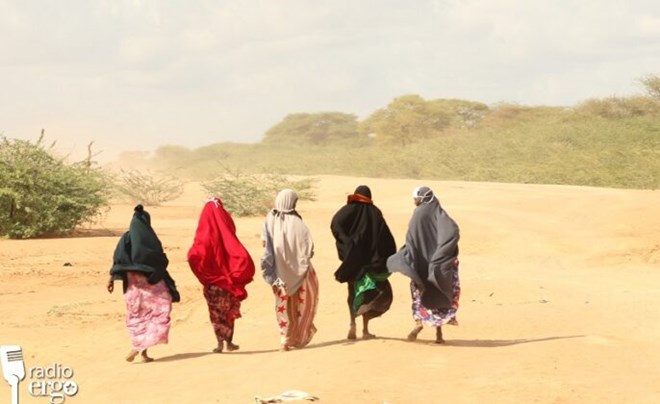
Friday April 16, 2021

Refugee women walk desperately seeking odd jobs/File Photo/Ergo
Kadijo Ali Abdi, a mother of five, moved out of her rented house in the central Somali town of Galkayo’s Hawl-wadag neighbourhood into a camp for internally displaced people on 20 March, after losing her cleaning job as a result of the new surge of COVID19.
The owners of the restaurant where she worked as a cleaner told her not to report to work anymore because of the spread of the virus. The restaurant, where she used to work four days a week making $10 a day, no longer had enough customers.
For three months, she tried her best to get odd jobs and lived on diminishing resources, earning at most one and a half dollars from her random daily hustle.
However, she could no longer afford the $20 house rent she had been paying. Even in Qorahey IDP camp, where she is living now, she does not know where the family’s next meal will come from.
“I leave my home early in the morning to search for a job. I sit next to food stores hoping to get a client,” Khadijo told Radio Ergo.
On lucky days she may find a client after sitting in the sun for six or seven hours.
A similar fate has befallen uncounted Somali women, who used to work as cleaners in businesses, offices and private homes in Galkayo, as the resurgence of COVID19 has led to shrinking of the economy as well as fear of infection.
Haredo Sugal Ismael, a mother of nine, used to earn $60 a week from cleaning jobs. She has been reduced to surviving on food she begs from some of her friends receiving, remittance money from their relatives abroad.
“We cook and eat once a day, whatever we get from our neighbours. I tried going round looking for a cleaning job but to no avail,” she told Radio Ergo.
“Some of the locals have told me they don’t have money to pay for my services, others said they fear the disease.”
Haredo, who lives in an IDP camp on the outskirts of Galkayo, felt that her life was comfortable before the new wave of COVID19. She was earning $14 a day three days a week as an office cleaner, and three days a week cleaning privately owned houses for $6 a day. Five of her children were enrolled at a local school, where she paid $25 monthly school fees.
But her children have been at home since March, as she has been out of work since February.
“The teachers need money which I don’t have currently. Even the food I am feeding them is a hustle,” said Haredo.
Maryamo Hassan Abdi, a widowed mother of five, has been going to the market every day since February looking for a job, having worked as a cleaner for close to 10 years.
“On some days I get two and a half dollars, other times I come back home empty handed,” she declared.
Maryamo and her children have been surviving on five kilograms of sugar and rice given to them by neighbours on 1 April, when they saw that she and her children had spent two consecutive days without anything to eat.
Before she lost her regular job, Maryamo was paying $15 in school fees for three of her children. Like many others dependent on the fragile income of their mothers, they have had to drop out of school and are hanging around at home.